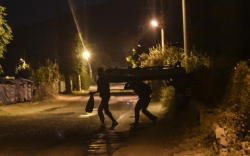








The short distance between beach town Bodrum and Kos has made it a key transit point for migrants headed to Europe
A day after the decomposing remains of 71 refugees were discovered crammed in the back of a truck in Austria, authorities in Libya spent Friday pulling up the drowned bodies of more than 100 refugees off its coast — grim developments that have underscored the crisis at Europe’s borders.
Austria's Interior Minister Johanna Mikl-Leitner said the tragedy in her country "should serve as a wake-up call ... for joint European action" in dealing with the refugees escaping to Europe. This year, tens of thousands of people have risked everything to seek a better life or refuge in wealthy European countries. At least 2,500 have died, mostly at sea.
More than 300,000 people — many of them trying to flee war, conflict and persecution in countries including Syria and Afghanistan — have sought to cross the Mediterranean Sea so far in 2015, up from 219,000 in all of last year. The International Office of Migration (IOM) has recorded 2,636 deaths linked to Mediterranean crossings this year, while more may have disappeared beneath the waves out of sight of rescuers.
Refugees fearful of death at sea in overcrowded and flimsy boats have been turning to a land route to Europe through the Western Balkans. They start in Greece, which they can reach via a short boat trip from Turkey, then move on through Macedonia and Serbia into Hungary, where thousands have been crossing the border every day, crawling over or under a razor-wire fence meant to keep them out.
The 71 refugees who were found dead Thursday were discovered on the main Austrian highway leading to Hungary. Of the 71 dead, 59 were men, 8 were women and four were children, including a girl estimated at 1-2 years old and three boys of roughly 8-10 years.
The truck containing the victims' bodies was towed to a cooled border warehouse before police and forensic experts began unloading the decaying remains before shipping them to a Vienna morgue for autopsies. On Friday workers continued the task, wearing gloves and respirators as they hefted plastic body bags into coffins lined up on the warehouse ramp. One after another, five trucks backed up to be loaded.
Austrian police said three people had been arrested in Hungary, while their Hungarian counterparts said four were in detention in connection with the discovery of the bodies. There was no immediate explanation for the discrepancy.
Meanwhile, in a separate tragedy, two ships went down Thursday off the western Libyan city of Zuwara, where Hussein Asheini of the Red Crescent said at least 105 bodies had been recovered. About 100 people were rescued, according to the Office of the U.N. High Commissioner for Refugees, with at least 100 more believed to be missing.
"A coast guard team is still diving in and checking inside to see if there's anyone else," Asheini said.
Workers pulled the dead from the water and placed them in orange-and-black body bags that were laid out on the waterfront in Zuwara, about 65 miles west of Tripoli. Several victims floated face-down in a flooded boat towed into the harbor. At least one of the dead wore a life vest.
Most of the people rescued came from Syria and sub-Saharan African countries, said Mohamed al-Misrati, the spokesman for the Red Crescent in Libya.
"You can imagine what they are going through. Some of them are still looking for their friends. We're trying to speak to them but many of them are too traumatized to even talk about the incident," he said.
Mohamed al-Misrati
Red Crescent spokesman
Meanwhile, German Chancellor Angela Merkel said Friday that European Union interior ministers meeting this weekend would be looking into "rapid changes to the asylum system." Germany, which expects some 800,000 migrants this year, has complained that many others in Europe aren't pulling their weight in dealing with the growing number of refugees.
Merkel said Greece and Italy — two countries bearing the brunt of the current crisis — needed to be supported with common registration centers equipped with "European-wide personnel," but also with the assurance that the refugees coming in would then be distributed around Europe.
"There has to be a fair distribution of refugees and asylum-seekers who are deemed eligible," she said at a news conference with Denmark's Prime Minister Lars Loekke Rasmussen.
Al Jazeera and wire services
The bodies were found inside a refrigeration truck on the side of an Austrian highway; 3 arrests made in Hungary
Authorities observed removing corpses from waters off city of Zuwara — a launch pad for migrant ships headed for Europe
Error
Sorry, your comment was not saved due to a technical problem. Please try again later or using a different browser.